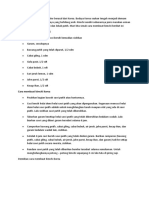Modul Bahasa Inggris Basic 1.pdf
Every Monday, Sally (drive).her kids to football practice. Usually, I (work) as a secretary at ABT, but this summer I (study) French at a language school in Paris. That is why I am in Paris. John (sleep). Don't forget to take your umbrella. I hate living in Seattle because it (rain, always).
I'm sorry I can't hear what you (say) because everybody (talk).so loudly. Justin (write, currently).a book about his adventures in Tibet. I hope he can find a good publisher when he is finished. Jim: Do you want to come over for dinner tonight? Denise: Oh, I'm sorry, I can't.
I (go).to a movie tonight with some friends. The business cards (be, normally ) printed by a company in New York. Their prices (be).inexpensive, yet the quality of their work is quite good. This delicious chocolate (be).made by a small chocolate in Zurich, Switzerland. She answered my question when I paid her one dollar. When-clauses are important because they always happen first when both clauses are in the Simple Past. Both of the examples above mean the same thing: first, I paid her one dollar, and then, she answered my question.
Mar 8, 2012 - Modul ini memuat ringkasan materi bahasa Inggris dengan didikuti latihan. Seperti pola-pola dasar kalimat bahasa Inggris, words, phrases,.


It is not important whether 'when I paid her one dollar' is at the beginning of the sentence or at the end of the sentence. However, the example below has a different meaning. First, she answered my question, and then, I paid her one dollar. Active / Passive Verb Forms Sentences can be active or passive. Therefore, tenses also have 'active forms' and 'passive forms.' You must learn to recognize the difference to successfully speak English.
Active Form In active sentences, the thing doing the action is the subject of the sentence and the thing receiving the action is the object. Most sentences are active.
[Thing doing action] + [verb] + [thing receiving action] Examples: Passive Form In passive sentences, the thing receiving the action is the subject of the sentence and the thing doing the action is optionally included near the end of the sentence. You can use the passive form if you think that the thing receiving the action is more important or should be emphasized. You can also use the passive form if you do not know who is doing the action or if you do not want to mention who is doing the action. [Thing receiving action] + [be] + [past participle of verb] + [by] + [thing doing action] Examples: Active / Passive Overview. Sequence of events On the first day the Merino wethers were crutched.
I helped by sweeping up after the rouseabout picked up the wool pieces. Shearers start early (at 7.30 am). After lunch, we started shearing the lambs. There were more than 400 so we didn't finish until the next day. Once again I was sweeping and picking up dags. I was tired by the end of the day in the shed but our work wasn't finished.
We all had to help to get the wethers and lambs back into the paddocks. As well, we had to get a mob of ewes and their lambs into the yards for shearing the next day. Then it was time for tea (that's what my nanna calls dinner). Reorientation: Optional – closure of events. (biasanya berisi komentar pribadi / penilaian. Tidak selau ada dalam teks RECOUNT.
Ayo, berdasarkan contoh diatas ada yang bisa menyebutkan ciri – ciri teks RECOUNT!  Yap, betul, sebagian ciri – ciri teks RECOUNT adalah sebagai berikut: • Use of past tense (Penggunaan waktu masa lampau) • Focus on temporal sequence (Fokus pada urutan waktu dengan kata – kata penghubung yang menunjukkan waktu mis: when, after, then dsb) • Noun and noun phrases (Penggunaan kata benda maupun phrasa kata benda) • Focus on specific participant ( Fokus pada tokoh secara spesifik I, We, the fourth grade). He had better (no auxiliary) Here are some mixed examples: • But you don't really love her, do you? • This will work, won't it? • Well, I couldn't help it, could I? • But you'll tell me if she calls, won't you?
Yap, betul, sebagian ciri – ciri teks RECOUNT adalah sebagai berikut: • Use of past tense (Penggunaan waktu masa lampau) • Focus on temporal sequence (Fokus pada urutan waktu dengan kata – kata penghubung yang menunjukkan waktu mis: when, after, then dsb) • Noun and noun phrases (Penggunaan kata benda maupun phrasa kata benda) • Focus on specific participant ( Fokus pada tokoh secara spesifik I, We, the fourth grade). He had better (no auxiliary) Here are some mixed examples: • But you don't really love her, do you? • This will work, won't it? • Well, I couldn't help it, could I? • But you'll tell me if she calls, won't you?
• We'd never have known, would we? • The weather's bad, isn't it? • You won't be late, will you? • Nobody knows, do they?
License keys nod32 version 10 username and password available at patchversion.com, latest serial key for nod32 antivirus, ESET NOD32 11 Thank you. Eset nod32 antivirus 4 username and password 2018 ford. ESET Internet Security Offline Installer Version available only One Click and download, the virus signature database and ThreatSense very fast scanning engine from NOD32 Antivirus 11 2018.
Notice that we often use tag questions to ask for information or help, starting with a negative statement. This is quite a friendly/polite way of making a request. For example, instead of saying 'Where is the police station?' (not very polite), or 'Do you know where the police station is?' (slightly more polite), we could say: 'You wouldn't know where the police station is, would you?' Here are some more examples: • You don't know of any good jobs, do you?
• You couldn't help me with my homework, could you? • You haven't got $10 to lend me, have you? Intonation We can change the meaning of a tag question with the musical pitch of our voice. With rising intonation, it sounds like a real question. But if our intonation falls, it sounds more like a statement that doesn't require a real answer. In some languages, people answer a question like 'Snow isn't black, is it?' With 'Yes' (meaning 'Yes, I agree with you').